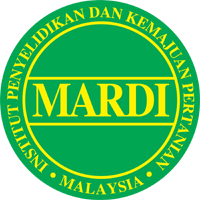K.Y. Lum and H.K.Won
Abstract
Bacterial wilt, the major limiting factor to large-scale cultivation of tomatoes in the lowlands, can be successfully overcome when tomato scions are grafted onto selected resistant brinjal rootstocks. Grafts are totally compatible; for perfect union, four-week old scions and six-week old rootstocks are recommended. Using local brinjal varieties 'Hitam Bulat' or 'Sabah Common' as rootstocks, the incidence of bacterial wilt can be consistently reduced to below ten percent in fields where ungrafted tomato cultivars suffer total loss.
Full Text ( 519 KB )








